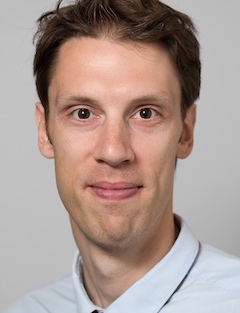Head of Computer Vision & Learning Group,
Institute of Computer Science,
Ludwig Maximilian University of Munich
Akademiestr. 7
D-80799 Munich
Tel.(office): +49 (0)89/2180-73431
Tel.(secret.): +49 (0)89/2180-73430
FAX: +49 (0)89/2180-9973431
Email: b.ommer (at) lmu (dot) de![]()
![]()
»» Open PhD and PostDoc Positions
»» our work on Stable Diffusion

Short Bio
Björn Ommer is a full professor at LMU where he heads the Computer Vision & Learning Group (previously Computer Vision Group Heidelberg). Before he was a full professor at the Department of Mathematics and Computer Science of Heidelberg University and also served as a one of the directors of the Interdisciplinary Center for Scientific Computing (IWR) and of the Heidelberg Collaboratory for Image Processing (HCI).
He has studied computer science together with physics as a minor subject at the University of Bonn, Germany. After that he pursued his doctoral studies in computer science at ETH Zurich. He received his Ph.D. degree from ETH Zurich for his dissertation “Learning the Compositional Nature of Objects for Visual Recognition” which was awarded the ETH Medal. Thereafter, Björn held a post-doc position in the Computer Vision Group of Jitendra Malik at UC Berkeley.
He serves as as LMU’s Chief AI Officer, as co-director of the Bavarian AI Council, as coordinator of the Bavarian AI Foundation Model Initiative of the StMWK, as an associate editor for the journal IEEE T-PAMI, and previously for Pattern Recognition Letters. Björn is an ELLIS Fellow, an ELLIS unit faculty of the ELLIS unit Munich, affiliated with the Helmholtz foundation, and a PI of the Munich Center for Machine Learning (MCML). He has served as program chair for GCPR, as Senior Area Chair and Area Chair for multiple CVPR, ICCV, ECCV, and NeurIPS conferences, and as workshop and tutorial organizer at these venues. Björn delivered the opening keynote at NeurIPS’23, was awarded the German AI-Prize 2024, the Technology-Prize of Eduard-Rhein-Foundation 2024, and the work leading to Stable Diffusion has been nominated for the German Future Prize of the President of Germany (“Deutscher Zukunftspreis des Bundespräsidenten für Technik und Innovation”).
Research Interests
All aspects of semantic image and video understanding based on (deep) machine learning;
esp.: generative approaches for visual synthesis (e.g. Stable Diffusion), invertible deep models for explainable AI, deep metric and representation learning, and self-supervised learning paradigms and their interdisciplinary applications in the digital humanities and neurosciences.
Publications
Please see the publications page.
PhD or Master Thesis Supervision
I have the privilege of working with a great team who are incredibly gifted and nice to be with and our lab is located in beautiful downtown Munich. If you want to join: I am supervising Master and PhD students and PostDocs on topics of Computer Vision and Machine Learning in the faculty of Mathematics, Informatics, and Statistics at LMU.
If you are interested please see our open positions.
Selected Talks and Publications in Popular Science
Stable Diffusion in the Press,
Generative AI and the Future of Intelligence, Opening Keynote at re:publica’25 (English version)
Op-ed in Frankfurter Allgemeine Zeitung (FAZ), (freely accessible Reprint), p.3, Jan 16, 2025
Generative AI: Future-Proofing Germany’s Innovation Hub, Keynote @ DLD, 2025
Generative AI: What’s Next?, Keynote @ DLD AI Summit, 2023
Generative AI: Brave New World?, Keynote @ re:publica (engl. translation), 2023
Visual Synthesis for Understanding our (Visual) World, Talk @ TUM AI Lecture Series, 2022
These Neural Networks Have Superpowers!, Video on Two-Minute-Papers about our VQGAN paper (CVPR’21 oral).
Self-Supervision: Learning to Learn, Talk @ Heidelberg AI, 01/2019.
Das Objekt jenseits der Digitalisierung, The Future of the Digital Humanities beyond Digitization, Talk @ Deutsches Museum, 12/2018.
AI Learned How To Generate Human Appearance, Video on Two-Minute-Papers about our CVPR’18 paper on disentangling human behavior and appearance.
Painter AI Fools Art Historians, Video on Two-Minute-Papers about our ECCV’18 paper on artistic style transfer.
Improving Stroke Treatment Through Machine Learning, report on interdisciplinary project with neuroscientists from ETH Zurich.
Björn Ommer, From Chaos to Image – The Grammar of Patterns, in: Universitas 68(810): 46-55, 2013.
Björn Ommer, Vom Pixel zum Bild – Wie Computer das Sehen lernen und die Forschungsarbeiten von Geistes- und Naturwissenschaftlern unterstützen können, in: Ruperto Carola Magazine, 02/2011.
Automatische Bildanalyse – Blinde Computer sollen sehen lernen, in: Spiegel Online news report, 22.07.2011.